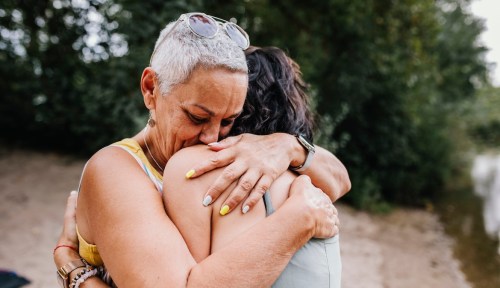The word “cyberbullying” first appeared in a 1995 New York Times article, but if you Google it now, you’ll be met with nearly 23 million results. The rapid growth of the term—which describes harassing someone via electronic communication, often anonymously—reflects its devastating prevalence: As of 2019, around 37 percent of people between the ages of 12 and 17 were being bullied online, and there’s also evidence to suggest that cyberbullying plagues adults, too. And while both virtual and IRL bullying share many of the same damaging features and consequences, the online form of harassment can be uniquely troubling for mental well-being.
Experts in This Article
licensed psychologist and president and chief clinical officer at Deep Eddy Therapy
Lisa Ibekwe, LCSW, child and adolescent therapist.
According to psychologist Kyler Shumway, PsyD, there are three essential differences separating cyberbullying and IRL bullying:
- 1.The presence of the bully
- 2.How fast and far information can spread
- 3.The quality (and quantity) of the content being shared
“Cyberbullying offers a chance to be aggressive from a safe, anonymous distance,” he says, citing an increasing body of research that indicates people are more likely to behave cruelly when their identity is concealed. One 2014 study, for example, compared non-anonymous and anonymous comments on online newspaper stories and found that nearly 54 percent of anonymous comments included language considered vulgar, racist, hateful, or profane. Only about 29 percent of non-anonymous comments fell under one of these four “uncivil” categories, by contrast.
“Cyberbullying offers a chance to be aggressive from a safe, anonymous distance.” —Kyler Shumway, PsyD
For a more recent example of the possible relationship between anonymity and cyberbullying, take the April 6 report by the Center for Countering Digital Hate (CCDH) outlining Instagram’s failure to act on abusive direct messages sent using the app. The report looked into the Instagram DMs of five public figures, and found that one in 15 of the 8,717 total direct messages analyzed violated the social media app’s abuse and harassment rules. Before the era of social media, people would not have had such easy access to just anyone. And even if they did, anonymity would be harder to achieve in personal interactions, ostensibly lowering rates of hateful or otherwise abusive sentiments shared.
Another influential factor that separates digital from analog bullying is how rapidly and widely harmful language can spread, adds Dr. Shumway. “Cyberbullying sometimes utilizes technology in ways that amplify the effect of social bullying. In the pre-internet era, if someone called you a name or spread rumors about you, those things could only be shared to those in close proximity. But now, you can post mean, hurtful things for the world to see,” he says.
For another Instagram-based example, consider the case of a 15-year-old student named Yael. In 2018, The Atlantic outlined her experience of amplified bullying and passive aggressive behavior online by an ex friend. “She unfollowed me, blocked me, unblocked me, then messaged me days on end, paragraphs,” said Yael. “She posted about me constantly on her account, mentioned me in her Story, and messaged me over and over again for weeks.” Without the online platform, the abusive messages likely would have been contained to a small social group rather than available for anyone with an account to see.
Furthermore, cyberbullying often leaves a record trail that never erases, thanks to internet’s digital permanence. (That is, even if someone deletes something harmful, there’s likely a record.) “One of the big issues with cyberbullying is that it doesn’t end,” says Georgia-based child and adolescent therapist Lisa Ibekwe, LCSW. “Unlike traditional bullying, kids can get away from it when they leave the space, but cyberbullying follows you wherever you go.”
“One of the big issues with cyberbullying is that it doesn’t end. Unlike traditional bullying, it follows you wherever you go.” —Lisa Ibekwe, LCSW
And finally, cyberbullies have much more content to choose from in an era when almost everyone has a camera on their phone. “Now that we all have smartphones that can capture audio and video on the fly, we can catch people doing embarrassing, shameful things and show those to everyone in our network,” says Dr. Shumway. And the mental fallout from that quick and effortless spread can be catastrophic.
The mental toll of cyberbullying
Much of the research on bullying and cyberbullying is intertwined, and thus it’s hard to nail down the specific psychological differences between being bullied on your phone and being bullied in person. “All bullying causes harm to the survivor. The latest research tells us what we already know: Survivors often suffer symptoms of depression, such as reduced self-esteem, or thoughts of suicide or harming themselves,” says Dr. Shumway. “Additionally, many have reduced academic performance, substance use, and even become aggressive towards their peers.”
Interestingly, bullying is also bad for the bullies themselves: Per the U.S. Department of Health and Human Services, they may express more aggression, antisocial behaviors, and substance abuse as well. And, for what it’s worth, bystanders don’t get away unscathed, either. Research shows that they may experience increased anxiety and depression in the aftermath of the bullying.
Research on adult cyberbullying, specifically, suggests both the prevalence and devastating health outcomes are far from over when school ends. “The most likely victims of bullying are those who are different from those around them, whether in appearance, neurodiversity, or financial status,” says Dr. Shumway. “We also know that teens are much more likely to engage in cyberbullying, mostly due to access, and that teen girls may be at a particularly high risk compared to boys.” One study found that 38 percent of girls reported being cyberbullied, compared to 26 percent of boys. And a 2019 report focused on LGBTQ+ bullying found that youth who identified as lesbian, gay, or bi were 26.6 percent more likely to be cyberbullied than their straight-identifying peers.
What to do if you’re being bullied online
If someone is making you feel powerless online, Ibekwe says your first step should always be to tell someone. “If you are being bullied, we always recommend talking to someone. Sometimes people hold off because of the fear of embarrassment or retaliation from peers, but in actuality, many children who have attempted or even completed suicide have been bullied at some point in their lives,” she says. “Sharing what’s happening is nothing to be ashamed about.”
That said, there are a few other steps you cant take to protect your mental well-being if someone’s cyberbullying you.
- Do not engage with “trolls”: “For those who don’t know what a ‘troll’ is, these are people who act as online antagonists that get a great deal of joy from generating angry responses from others. When in doubt, do not respond to someone who is cyberbullying you online, as this often makes things worse,” says Dr. Shumway.
- Save the evidence: Take screenshots and record the behavior that’s coming your way. Some states will allow you to take legal action against the person bullying you if that’s an avenue you want to pursue.
- Stick with your allies: “This will [help you] name the behavior as toxic or wrong without you engaging and risking making things worse. And, often others will join your friend in your defense. No one likes a bully,” says Dr. Shumway.
- Lay low online: Block, unfriend, or unfollow the person who’s hurting you and turn your attention to offline joys. “Do whatever you need to keep distance from those who are trying to harm you,” says Dr. Shumway.
- Care for yourself: Ibekwe is a big advocate of using that time away from social media to journal, relax, or do whatever brings you peace in an unpeaceful time.
If you or someone you know is experiencing cyberbullying, English-speaking individuals can call the National Suicide Prevention Lifeline at 1-800-273-8255. Spanish-speaking people can call 1-888-628-9454.
Sign Up for Our Daily Newsletter
Get all the latest in wellness, trends, food, fitness, beauty, and more delivered right to your inbox.
Got it, you've been added to our email list.











